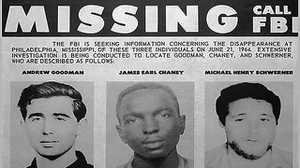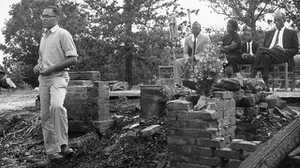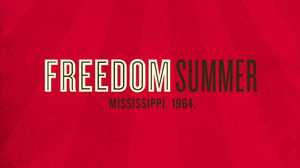Fannie Lou Hamer was born in 1917, the 20th child of Lou Ella and James Lee Townsend, sharecroppers east of the Mississippi Delta. She first joined her family in the cotton fields at the age of six. Although she managed to complete several years of school, by adolescence she was picking hundreds of pounds of cotton a day. In the early 1940s she married Perry Hamer, known as Pap, and worked alongside him at W.D. Marlow’s plantation near Ruleville, in Sunflower County. Hamer’s ability to read and write earned her the job of timekeeper, a less physically demanding and more prestigious job within the sharecropping system.

The Hamers adopted two daughters, girls whose own families were unable to care for them. (They later adopted their two grandchildren after the older daughter’s death.) Hamer’s own pregnancies had all failed, and she was sterilized without her knowledge or consent in 1961. She was given a hysterectomy while in the hospital for minor surgery, a procedure so common it was known as a “Mississippi appendectomy.” “[In] the North Sunflower County Hospital, I would say about six out of the 10 Negro women that go to the hospital are sterilized with the tubes tied,” she told a Washington, DC, audience three years later.
The forced sterilization was one of the moments that set Hamer on the path to the forefront of the Mississippi Civil Rights movement, but the incident that brought her into a leadership role came a year later. On August 31, 1962, not long after attending a voting rights meeting organized by the Student Nonviolent Coordinating Committee (SNCC), Hamer joined 17 of her neighbors on a bus to Indianola, the county seat. Officials blocked most of the group from even attempting to register; Hamer and one man were the only ones allowed to fill out the application and take the literacy test, which both failed.
On the drive back to Ruleville, the bus was stopped and the driver arrested -- the bus was too yellow, the police claimed. While the passengers were held on the bus, the deeply religious Hamer began to sing spirituals. Singing, in particular, “This Little Light of Mine” and “Go Tell It on the Mountain,” became one of the defining features of her activism.
When the passengers scraped together enough money to cover the driver’s fine, the bus was allowed to return to Ruleville. When Hamer got home, she found that plantation owner W.D.

Marlow was already aware that she had tried to register to vote. He demanded that she withdraw her application. She refused, with an explanation that would become a familiar refrain in her Civil Rights speeches: “I didn’t go down there to register for you. I went down to register for myself.” Marlow ordered her off his land.
Hamer stayed with friends in Ruleville for a few days, but it was clear that there would be reprisals against the people who had gone to Indianola. Pap drove Hamer and their daughters to Tallahatchie County, where they stayed with rural relatives for some time before returning to Sunflower County, ready to take up the fight.
Her singing on the bus and her willingness to challenge the county registrar had been noticed by local organizers, and SNCC field secretary Bob Moses saw her as a potential leader. He sent Charles McLaurin, a young activist, to find Hamer and bring her to a SNCC conference at Fisk University in Nashville in the fall of 1962. The conference was a success, and Hamer left Nashville eager to take on her new role as a community organizer.
Pap Hamer had stayed at the Marlow plantation, working through the harvest to pay off the family’s sharecropping debt, but in the fall of 1962 he rejoined his wife and daughters. Marlow took possession of the Hamers’ car, as well as the contents of the house they had rented from him, so they started over in Ruleville. The family’s main source of income was Hamer’s $10 weekly stipend from SNCC.
Through 1962 and 1963, Hamer continued to work for desegregation and voter registration. She would also become involved in relief work, distributing donated food and clothes to the poorest Delta residents. Hamer had spent her entire life in poverty, and she understood that the fight for economic security was a crucial component of the Civil Rights movement. At the same time, she was willing to use the donations as leverage, and sometimes refused to hand over food until the recipients agreed to register to vote.
On June 9, 1963, Hamer and several fellow activists were returning from a citizenship training program in Charleston, South Carolina, when their bus stopped in Winona, Mississippi. In an act of protest, several members of the group sat at the bus station’s whites-only lunch counter. Before long the police removed them from the café, arresting six people.

In jail, several of the activists were beaten by the police and by other African American inmates, whom the police forced to use blackjack weapons. The damage done to Hamer’s eyes, legs, and kidneys would affect her for the rest of her life.
When the activists did not check in with the SNCC office that afternoon, organizers knew they were in trouble. It took several days -- and the arrest and beating of Lawrence Guyot, another SNCC worker -- before they were finally released on June 12. After they left the jail, Hamer and her colleagues learned that Medgar Evers had been assassinated on the front steps of his Jackson, MS home the previous day. As the NAACP field secretary, Evers had been the driving force behind the admission of the first black student to the University of Mississippi.

In the following months, Hamer increased her public profile, both through her SNCC work and as one of the founders of the Mississippi Freedom Democratic Party (MFDP), which challenged the dominant force in Mississippi politics, the pro-segregation Democratic Party. In early 1964, Hamer ran for Congress as the MFDP candidate. She challenged veteran Congressman Jamie Whitten in the Democratic primary. Though Whitten won with an overwhelming majority, Hamer’s run set a precedent by challenging the established Mississippi congressional delegation, and set the stage for the MFDP to have a national presence.
The work of MFDP was one part of the 1964 Mississippi Summer Project, or Freedom Summer, which brought hundreds of college students to the state to work for Civil Rights. Although some SNCC organizers were wary of bringing in a group of outsiders, mostly whites from the North, Hamer saw value in an integrated movement and convinced many to abandon their objections. “If we’re trying to break down this barrier of segregation, we can’t segregate ourselves,” she said in a SNCC meeting.
Hamer traveled to Oxford, Ohio, to train the volunteers who would be teaching classes and registering voters -- and to sing the spirituals and movement songs she was known for. Tracy Sugarman, who spent the summer in Mississippi as both a volunteer and a journalist, accompanied Hamer as she visited Delta churches to encourage parishioners to register to vote. “Mrs. Hamer rose majestically to her feet,” he wrote. “Her magnificent voice rolled through the chapel as she enlisted the Biblical ranks of martyrs and heroes to summon these folk to the Freedom banner. Her mounting, rolling battery of quotations and allusions from the Old and New Testaments stunned the audience with its thunder.”
While the student volunteers knocked on doors and taught classes, Hamer was busy with the MFDP. The party held its own conventions at the precinct, county, and state levels to select a group to send to Atlantic City in August, where they would challenge the seating of the all-white Mississippi delegates at the Democratic National Convention. Hamer was elected vice chair of the integrated delegation, which consisted of 64 black members and four white members.
The MFDP’s goal was to persuade the convention’s Credentials Committee to seat them as Mississippi representatives. President Lyndon Johnson, who needed Southern Democrats’ support in his bid for re-election, was determined to block them. Hamer was among those who testified before the Credentials Committee. During her powerful testimony, Johnson called a last-minute press conference, causing the networks to break with their convention coverage and broadcast from the White House instead.

But Johnson's ploy to keep Hamer off television did not work. Her testimony was compelling enough for many evening news programs to broadcast it, incidentally granting it a much larger audience. Hamer held the committee’s attention as she spoke from memory about her eviction from the Marlow plantation and her brutal beating in the Winona jail. After less than 10 minutes she concluded: “If the Freedom Democratic Party is not seated now, I question America. Is this America, the land of the free and the home of the brave, where we have to sleep with our telephones off the hooks because our lives be threatened daily because we want to live as decent human beings, in America?”
Nonetheless, under pressure from Johnson and Hubert Humphrey, members of the Credentials Committee dropped their support for the MFDP. As a conciliatory gesture, Democratic officials offered two at-large seats to MFDP representatives, though Humphrey made it clear Johnson would not stand for one of the seats going to Hamer, “The President has said he will not let that illiterate woman speak on the floor of the Democratic convention.” The MFDP rejected the offer, and Hamer’s voice was one of the loudest in opposition. “We didn’t come all this way for no two seats,” she said.

After the MFDP delegation returned to Mississippi, Hamer was in high demand as a speaker. Her appearances were good for fundraising, always a concern for civil rights organizations, and she spent the remainder of the 1960s balancing national activism with her work within Mississippi. Voting rights remained a priority, even after the passage of the Voting Rights Act in 1965, and Hamer took the lead in lawsuits that led to the first elections in which large numbers of black residents of Sunflower County were registered and eligible to vote in 1967. She also organized plaintiffs for a school desegregation lawsuit, instituted livestock and agricultural co-ops to improve economic prospects in the Delta, and was involved in the introduction of Head Start programs for low-income children of all races. Hamer had mixed success, particularly as her worsening health -- a combination of a lifetime in poverty, her 1963 beating, and a 1976 cancer diagnosis -- limited her capacity for public speaking and made fundraising difficult.
Hamer died in 1977 from complications associated with heart disease and cancer. Hundreds of local residents turned out for her funeral, as did most of the leaders of the civil rights movement. Stokely Carmichael of SNCC, Ella Baker of the Southern Christian Leadership Conference, Dorothy Height of the National Council of Negro Women, and Delta Democrat-Times editor Hodding Carter all spoke in celebration of Hamer's contributions to her family, her community, and the fight for Civil Rights that was her driving passion.








